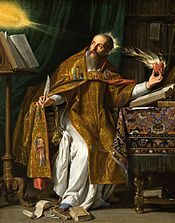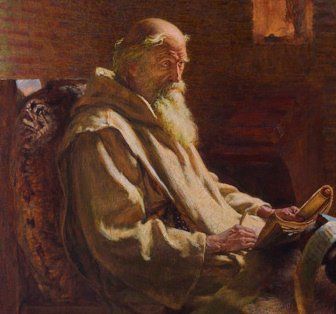
We saw last month that Celestius, the first disciple of Pelagius, was the real ‘father’ of what we now call ‘Pelagianism’. Fleeing from Rome to North Africa, Celestius sought ordination at the hands of Aurelius, pastor of the church in Carthage.
News of Celestius’ application reached a deacon of the church in Milan, who sent Aurelius a memo listing six heretical teachings of Celestius. The latter had written a book entitled Against the Doctrine of the Propagation of Sin. It was probably there that the Milanese deacon found these teachings.
Six heresies
These six heresies were:
1. Even if Adam had not sinned, he would still have died. Death, in other words, is purely natural. It is not the punishment for sin.
2. Adam’s sin harmed only himself, not the human race. Pelagianism teaches that there is no such thing as inherited original sin.
3. New-born children are in the same state as Adam before his fall. Celestius did not believe that every person is a guilty sinner in God’s sight from birth. He taught that sin is passed on through bad example.
4. The whole human race neither dies through Adam’s sin, nor rises again through the resurrection of Christ. This means that Adam was not the representative of all his descendants, and the value of Christ’s atonement is merely its good example.

5. The Mosaic Law is as good a guide to heaven as the gospel. Human beings, according to Celestius, still have the strength of will to desire good and to do right as long as they hear the requirements of the law.
6. Even before the advent of Christ there were men who were without sin. Sin, in Celestius’ thinking, was only external. He recognised misbehaviour, but did not see it as the fruit of a sinful heart.
Works religion
These six doctrines are a long way from the true biblical picture of man in sin. Basically, Pelagianism is legalistic works-religion.
It has to be said that Pelagius was well motivated, even though he wandered off into error.
In Britain, Pelagius had learned that good works are vitally important in the Christian life (Ephesians 2:10). He was admired as a fine preacher whose life backed up his words.
When he arrived in Rome he suffered a severe shock. He saw the moral laxity of professing Christians there.
Just a few years earlier the Emperor Theodosius had proclaimed Christianity the official religion of the Empire. Pelagius could see that this had not resulted in everyone becoming a true Christian. Rather, it had brought pagans into the church.

While he was right to be concerned about this, he misdiagnosed its cause. He concluded wrongly that the doctrine of salvation solely by grace lacks moral power and leads professing believers into carelessness and sin.
True faith upheld
In the eight years following the arrival of Pelagius and Celestius in Africa, Augustine and Jerome led the fight against Pelagianism. The true faith was finally upheld when, in A.D. 418, the Council of Carthage branded Pelagianism a heresy.
The main truths upheld at Carthage were: (1) Death is not a natural evil. It is a penalty imposed on man because of Adam’s sin; (2) Every person has inherited original sin from Adam; (3) Grace is not given to us just to help us do what we can do anyway by our own free will. It is absolutely indispensable.
The Council of Carthage made one other statement which we cannot endorse. It said that newly-born children need baptism in order to be cleansed from the taint of sin. This is the beginning of the Roman Catholic view of baptism, which claims that the rite has power in itself independently of faith.
A man called Julian of Eclanum tried to prolong the debate, but in 431 the Council of Ephesus upheld the decision of Carthage.
Nevertheless, Pelagianism has always been around in one form or another. It is a teaching that flatters human pride and appeals to the natural man.
Pelagianism in Britain
It was not until 429 that the heresy made a serious impact on the British church, though Britain immediately became one of the main centres for Pelagianism. It was one Agricola who brought the heresy to Britain.
Bede tells us how the British Christians found themselves at a loss to refute the plausible arguments of the Pelagians. So they ‘wisely decided to ask help from the bishops of Gaul in this spiritual conflict’.

The French church held a synod, probably at Troyes, and decided to send Germanus of Auxerre and Lupus of Troyes to Britain ‘to confirm their belief in God’s grace’.
Bede assures us that ‘the island of Britain was rapidly influenced by the reasoning, preaching, and virtues’ of the two emissaries. They preached the word every day, not only in the churches, but also in the open air. Christians were strengthened and heretics corrected.
Later that year the two Frenchmen returned home. After a few years there was a resurgence of Pelagianism in Britain. Word was sent across the channel asking for Germanus to return.
He duly came, accompanied this time by Severus. Once again, their mission was a success. With matters settled in Britain, they returned to France.
Setbacks
The fifth century saw the start of an era of energetic missionary expansion of the church in the British Isles. To understand the significance of this, we must go back to the middle of the previous century.
During the latter half of the fourth century, Christianity suffered setbacks. The problems began in A.D. 361, when a 30-year-old called Julian succeeded to the imperial throne.
He became known as ‘Julian the Apostate’. He had been brought up in a Christian family, but in his late teens he came under the influence of Libanius, a leading pagan teacher, and converted to paganism.
For some years he lived a double life. He maintained an appearance of Christian involvement while keeping his paganism secret. In 355 he was appointed assistant emperor, before becoming Emperor six years later.
Once Julian achieved ultimate power in the Empire, his pagan commitment came into the open. Paganism was restored to its former position as the established religion of the Empire.
Christianity was officially tolerated, but the emperor went out of his way to ridicule it. A policy of anti-Christian discrimination was applied in civil appointments, and at times Julian resorted to repression.
Attack
Although Julian’s reign lasted only two years, the revived paganism outlived him, at least in some areas of the Empire. In the British Isles this period saw a revival of Druidic paganism.
At the same time, southern Britain came under attack from the northern tribes, the Scots and Picts. In 367 the Picts reached London and Rome sent special legions to protect this outpost of the Empire.
At some later date, pagan Anglo-Saxons from Germany and Scandinavia began to occupy eastern Britain.
Historians differ as to precisely when and why Anglo-Saxon settlement began. Some date the Saxon influx to the 370s, claiming that the Romans arranged for Saxon mercenaries to help in the defence of Britain against the Picts and Scots.
The story then goes that in the early years of the next century the Germanic settlers rebelled against their Roman overlords, sent for reinforcements from Germany, and began to wage war on the Romans in Britain.
The withdrawal of Roman troops after the fall of Rome in 410 left the Britons defenceless against these new pagan settlers. The Anglo-Saxons began to dominate the country.
Other historians, however, suggest that the Anglo-Saxons began to enter Britain some time after the fall of Rome.
Deadly alternatives
There are three facts of which we can be sure. Firstly, by the end of the fourth century Rome was embroiled in conflict in Italy and the Empire was no longer in any position to defend Britain.
The fall of Rome in 410 saw the end of Roman rule in Britain.
Secondly, in A.D. 446 the southern British people made a last-ditch effort to secure help from the Empire against the Picts.
A letter was sent to the Roman consul Aetius, in which the Britons groaned: ‘The barbarians drive us into the sea, and the sea drives us back to the barbarians. Between these, two deadly alternatives confront us, drowning or slaughter’.
The appeal for help went unheeded. Aetius was in no position to assist. He was already engaged in a war with Attila the Hun who, according to Bede, ‘devastated nearly all Europe’.
Thirdly, the British high king, Vortigern, invited Saxon troops to occupy the country to defend it against the attacks from the north. This probably took place at the end of the 440s, just after the failed appeal to Rome, though some historians date it 20 years earlier.










